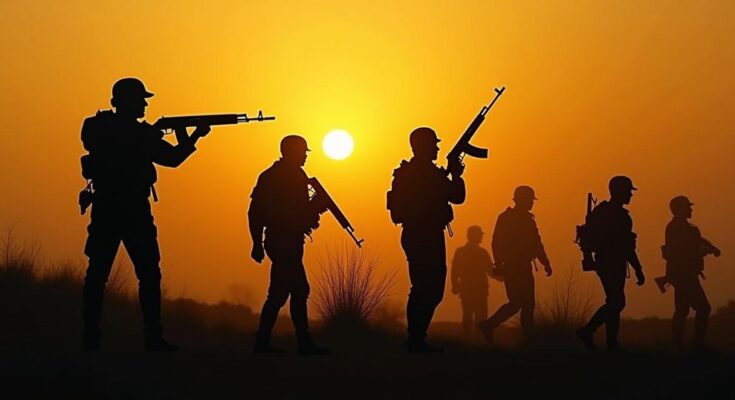Israeli airstrikes in Lebanon have killed seven senior Hezbollah officials, including leader Hassan Nasrallah, prompting shock across the region. This escalation signifies a major turning point in the conflict between Israel and Hezbollah, affecting the group’s military capabilities and political influence in Lebanon.
In recent events, a dramatic escalation in the ongoing conflict between Israel and Hezbollah has resulted in the killing of seven senior members of the militant group, including its leader, Hassan Nasrallah. This onslaught of Israeli airstrikes took place within a week, resulting in widespread shock across Lebanon and the broader Middle East, as Israeli officials hailed significant military and intelligence successes. Hezbollah had taken action to support Hamas shortly after the latter’s unexpected assault on southern Israel. The assassination of these key leaders marks a severe turning point, undermining Hezbollah’s standing, particularly as it attempts to recover from considerable losses involving figures that have been integral since the organization’s founding in the early 1980s. Hassan Nasrallah, a polarizing figure in Lebanon, directed Hezbollah from 1992 through multiple confrontations with Israel. Under his leadership, Hezbollah transformed into a formidable political and military force, actively vying for influence both within Lebanon and in regional conflicts, most notably aiding Syrian President Bashar Assad amid the Syrian civil war. Among the deceased, important names include Wafiq Kaouk, a deputy head of Hezbollah’s Central Council, who was viewed as a potential successor to Nasrallah; Imad Akil, a top commander leading the elite Radwan Forces; and other key military figures like Ahmed Wehbe, Ali Karaki, and Hashim Safieddine, who held pivotal roles in various operations and units of Hezbollah. The sudden vacuum left by the loss of these leaders is poised to have lasting ramifications for Hezbollah’s operational capabilities and its political influence within Lebanon. With the most senior officials like Nasrallah being eliminated, it prompts questions about the future leadership and structure of the organization, particularly as Israeli military actions continue to focus on senior commanders such as Naim Kassem and Talal Hamieh, both of whom remain under threat.
The recent military action underscores the volatile security dynamics in the Middle East, particularly regarding the long-standing rivalry between Hezbollah and Israel. Since its inception, Hezbollah has played a formidable role in Lebanese politics and has engaged in various regional conflicts, often aligned with Iranian interests. The organization’s leadership has been characterized by its strategic military operations as well as its significant influence within Lebanese society. The assassination of prominent figures, notably Hassan Nasrallah, signifies a crucial shift in this ongoing struggle—one that may disrupt Hezbollah’s command structure and operational strategies as tensions remain high amidst the Israeli-Palestinian conflict. These events also highlight the broader implications for regional stability, especially considering the ties between Hezbollah, Iran, and Syria, as well as the group’s involvement in various military engagements against Israel since the early 1980s.
In summary, the targeted killings of seven high-ranking Hezbollah officials, including Hassan Nasrallah, expose a critical juncture in the ongoing Israel-Hezbollah conflict. This wave of Israeli airstrikes not only alters the power dynamics within Hezbollah but also poses a serious challenge to the group’s operational capabilities and future leadership. The implications extend beyond Lebanon, potentially impacting the broader geopolitical landscape of the Middle East as tensions continue to rise.
Original Source: www.newsmax.com




